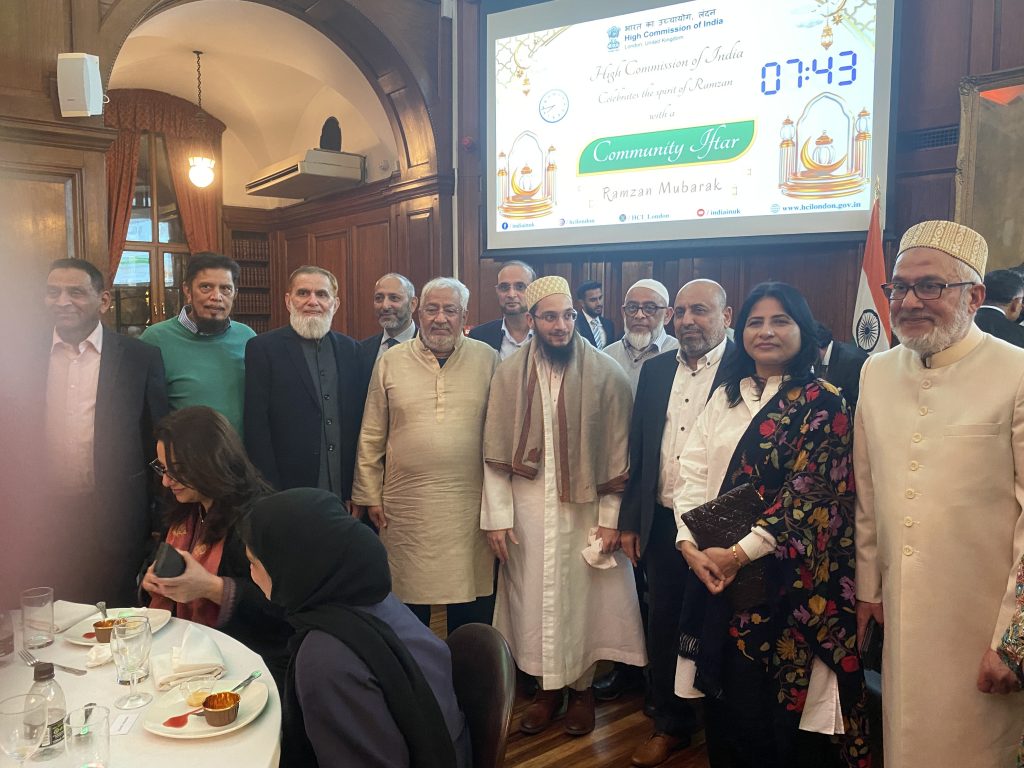
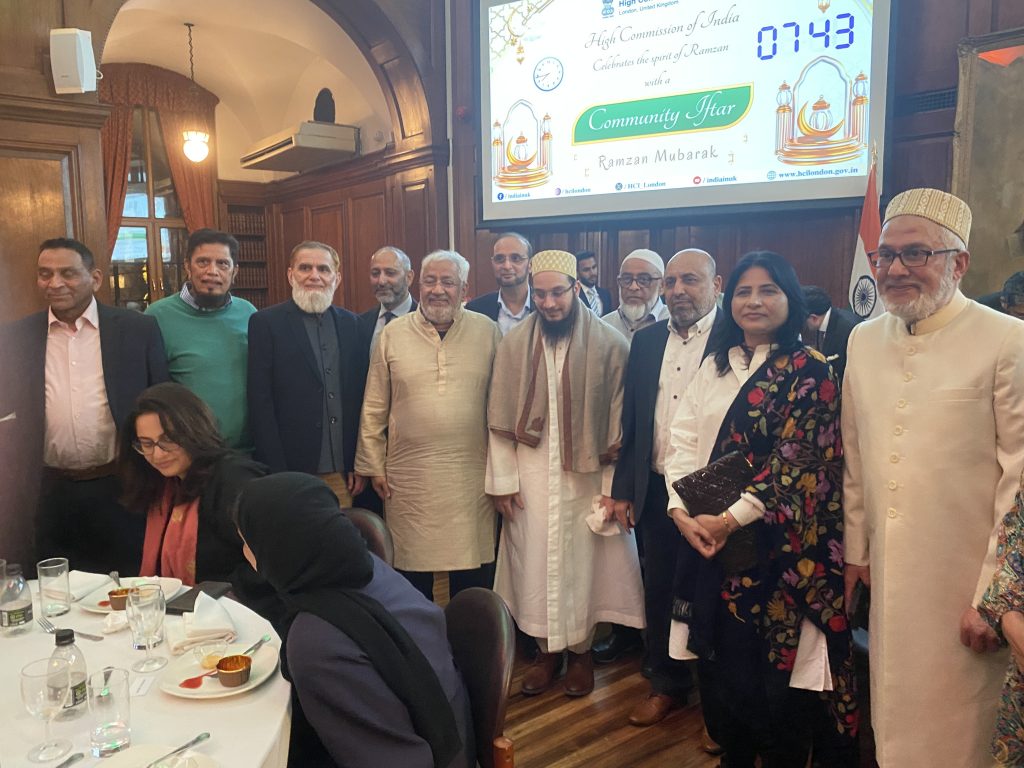
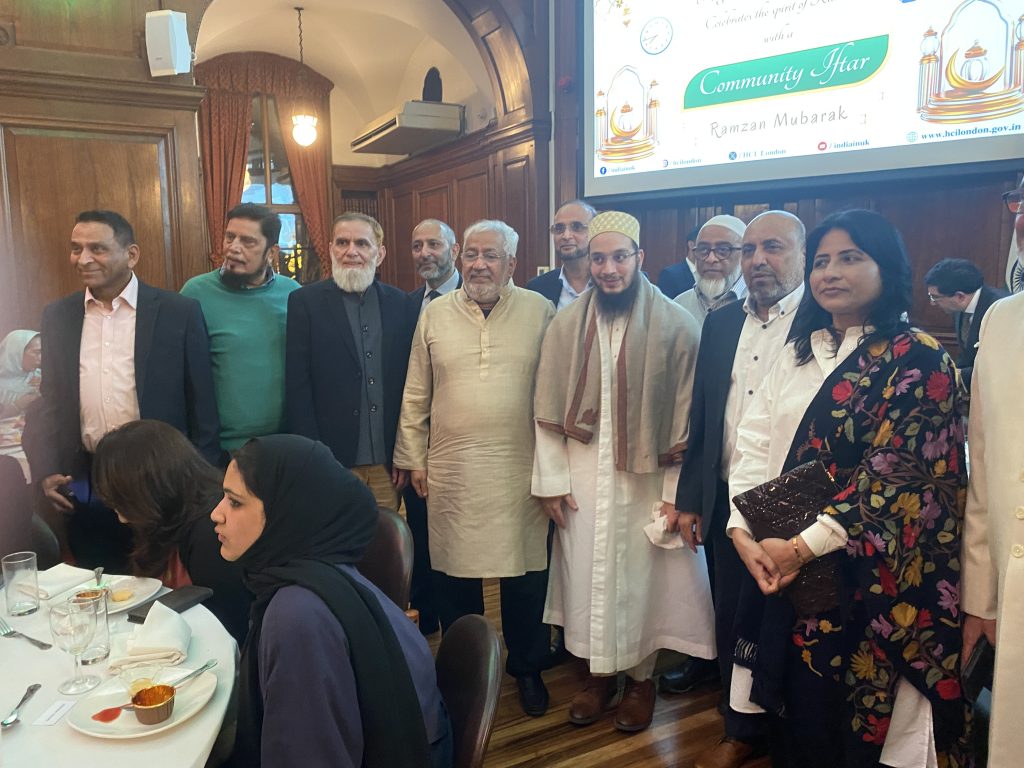
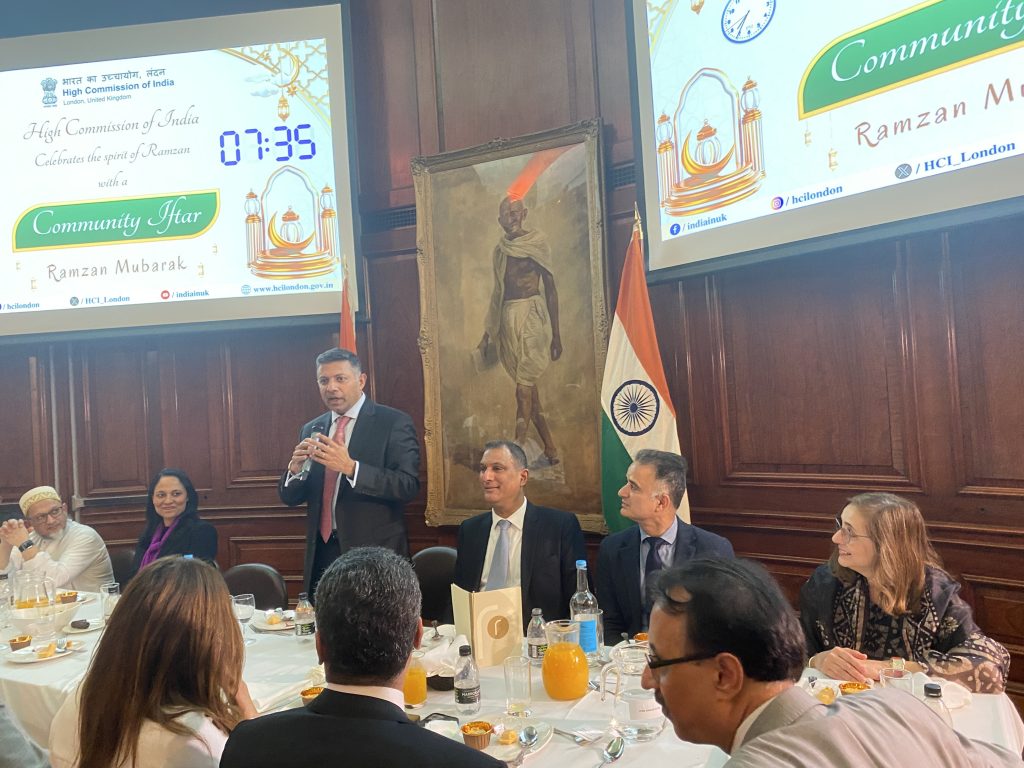
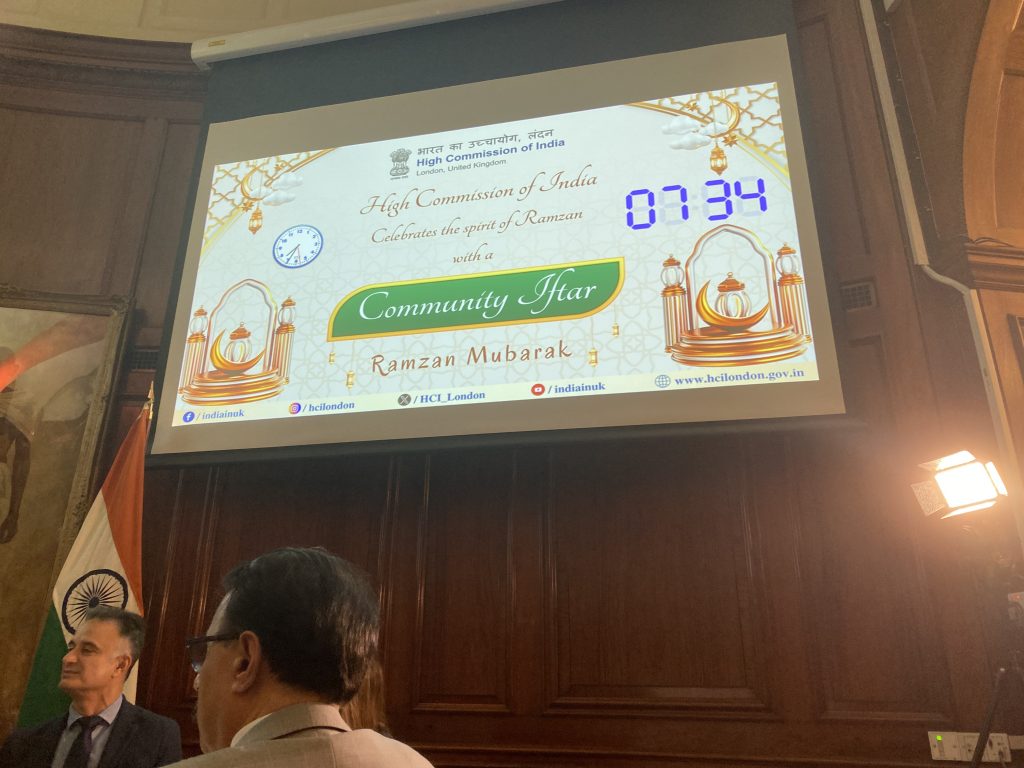
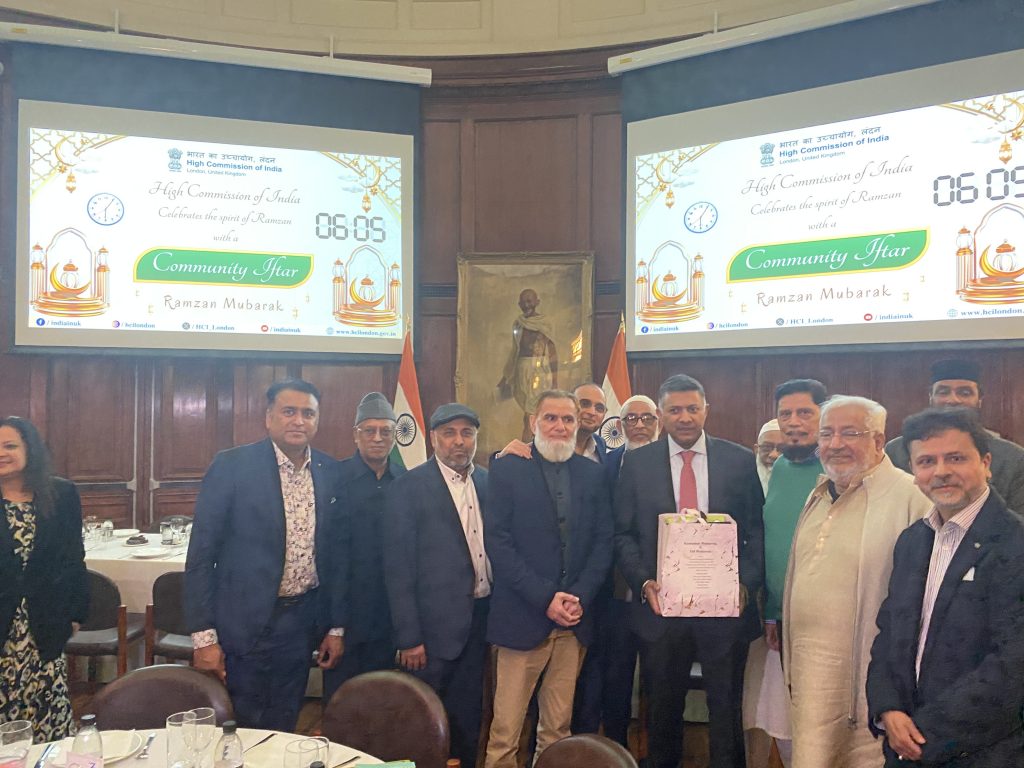
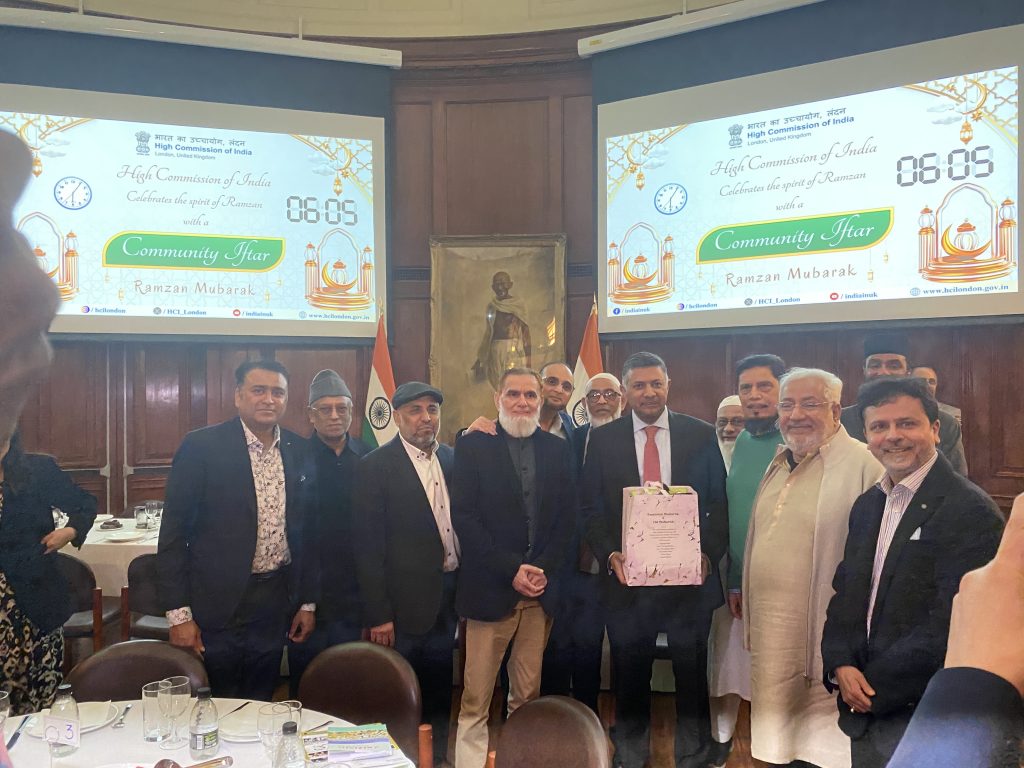
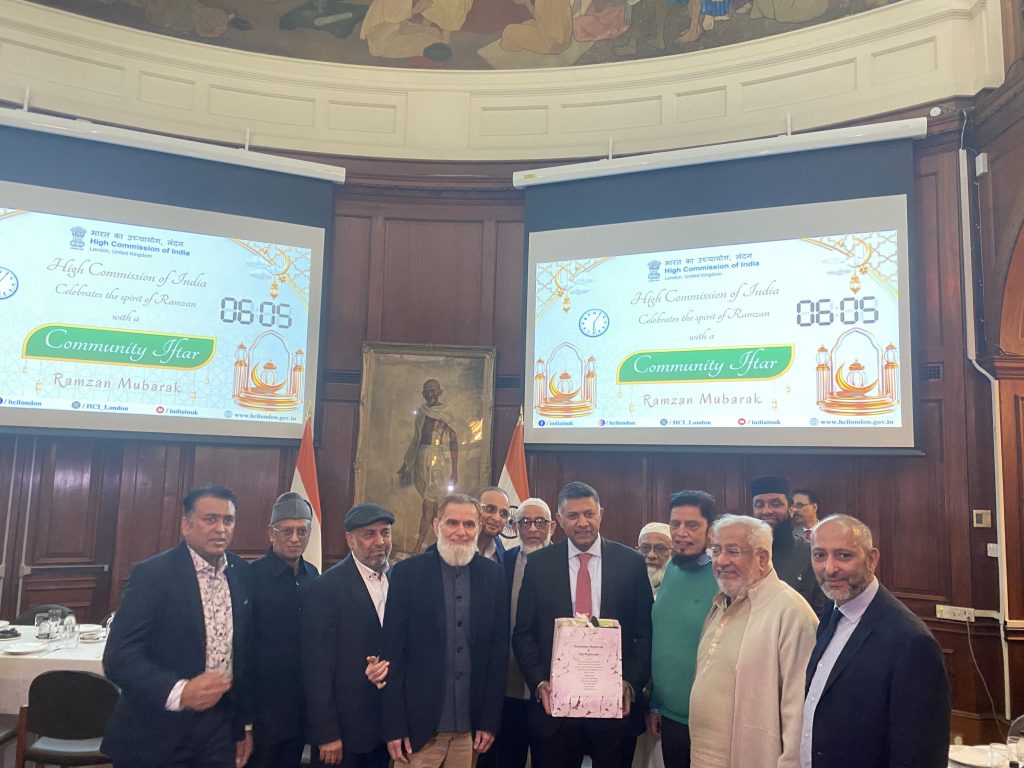
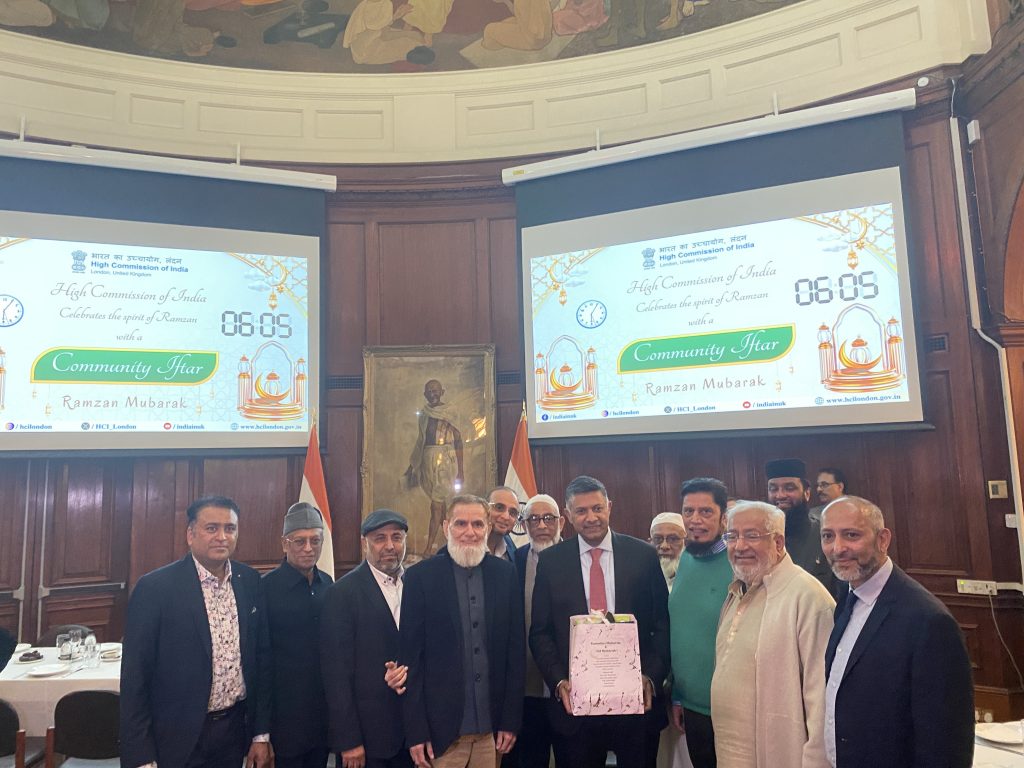
Indian High Commission hosted an iftar party at their premises. Executive committee members from Newham and Leytonstone branch attended









Indian High Commission hosted an iftar party at their premises. Executive committee members from Newham and Leytonstone branch attended
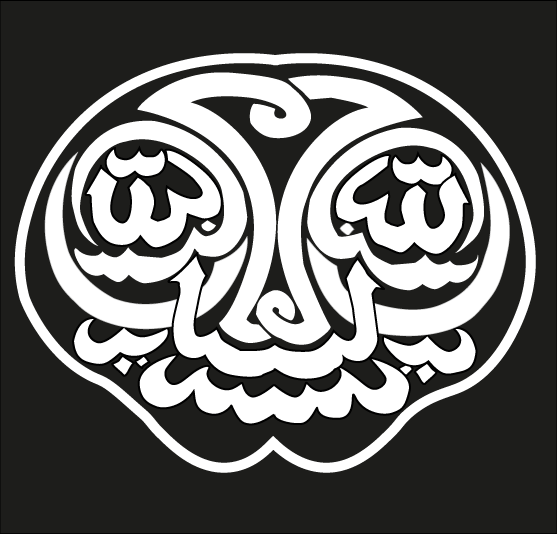
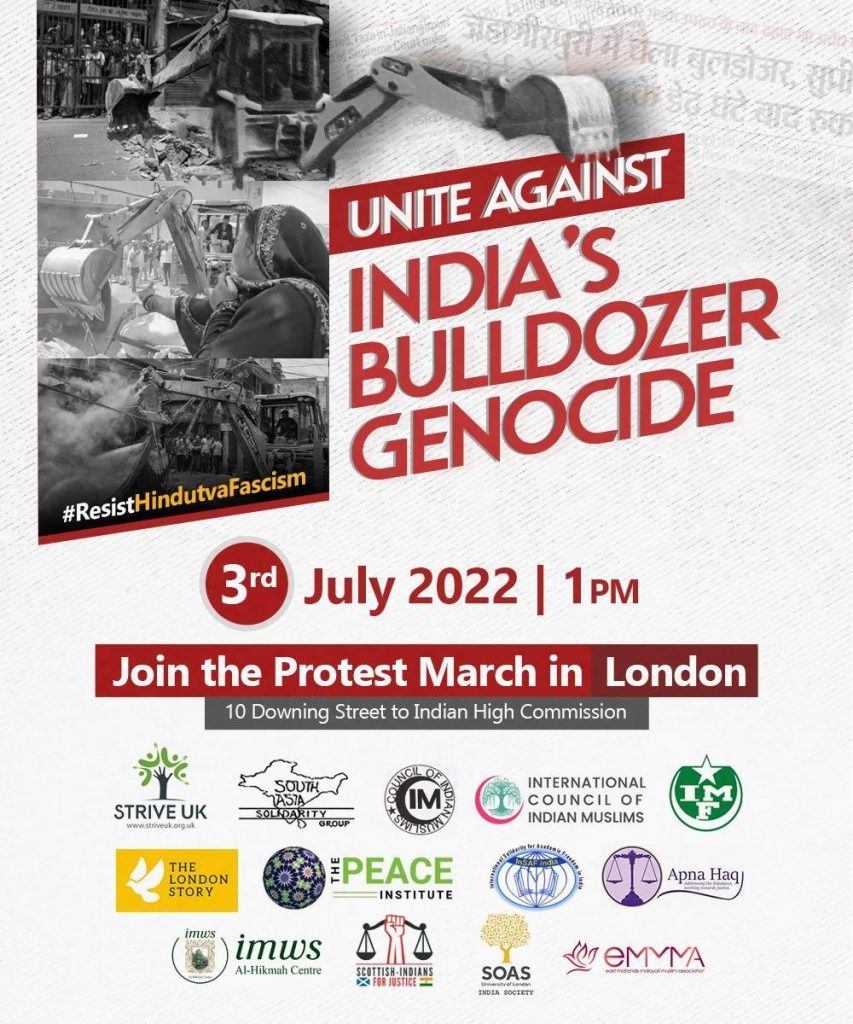
Unite against India’s bulldozer genocide
Join the protest on the 3rd of July at 1pm at 10 downing street. The Indian Muslim Federation UK and a number of other organisations are joining hands on this day:
Dear Members,
Assalam-O-Alykum,
Tawakkaltu alallah, I am pleased to inform that the Indian Muslim Federation hall is now open.
We wish to remind you that your membership fee of £10 for the year 2022-2023 is due.
It is preferred that you pay the membership fee by cheque or bank transfer. You can also send a deposit or transfer your annual fees into the IMF bank account as per details given below.
Account name: Indian Muslim Federation
Sort Code: 60-22-23
A/C no: 2129 4127
Please include at least 4 characters of your postcode, first name and surname in the reference even when sending a cheque by post.
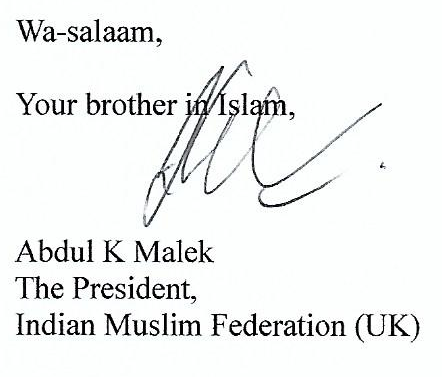
2002 Gujarat Riots
16:00:00
Geraint Davies (in the Chair)
Before we begin, I remind Members to observe social distancing and wear masks. I will call Kim Leadbeater to move the motion. I would normally then call the Minister to respond, but I think Theresa Villiers wants to make a brief contribution. Any time that is taken will limit the amount of time the Minister has to respond. This is only a 30-minute debate, and there will not be time for the lead Member to respond at the end.
Kim Leadbeater (Batley and Spen) (Lab)
I beg to move,
That this House has considered the 20th anniversary of the 2002 Gujarat riots.
It is a pleasure to serve under your chairmanship, Mr Davies. I am grateful for the opportunity to open this debate, which is my very first Westminster Hall debate.
The riots took place in the days following 27 February 2002 in the Indian state of Gujarat. The precise death toll remains a matter of dispute, even as we approach the 20th anniversary of the events. There is no agreement on the facts of what happened, never mind who was or was not complicit in instigating the violence or allowing it to continue. All we can say with certainty is that, at the very least, 1,000 people lost their lives and that the majority of them were Muslim.
There have been numerous investigations and inquiries, including by the Indian Supreme Court and highly respected organisations, such as the international Human Rights Watch. However, as far as I am aware, none of these has reached conclusions acceptable to all parties, communities and faiths. It is not my role here in the British Parliament—very distant in both time and location from those horrific occurrences—to pass judgment. I would not be able to do so even if I wanted to. What I can do, and what I very much want to do, is consider the legacy of what happened from the point of view of the families of those who lost their lives or were seriously injured. Today is about acknowledging the loss and hopefully providing some comfort, and maybe even some closure, for those families.
Every act of violence has repercussions well beyond those caught up directly in it. Some survivors and relatives will never fully get over the trauma of what happened. For others, while the pain may lessen over time, it will never disappear completely. As hon. Members will know, I have personal experience of this—not just of the loss and the hurt but, crucially, of the desire to never forget our loved ones and to try and learn something from the most horrific of events and so that we do all can to ensure they are not repeated.
Jim Shannon (Strangford) (DUP)
I congratulate the hon. Lady on bringing forward her first Westminster Hall debate. I have no doubt that it will be the first of many. Does she not agree that these devastating riots, which led to thousands of deaths, as she mentioned, hold lessons for us, and that we must continue to remember the 2002 Gujarat riots to teach our children the result of intolerance and anger?
Kim Leadbeater
I thank the hon. Gentleman for his intervention. I agree 100% with what he has said. We have to learn from the past, and far too often events are not acknowledged and the past is rewritten. We have to find a way to make sure that these things are never forgotten, for the future of our children.
Mr Tanmanjeet Singh Dhesi (Slough) (Lab)
I commend my hon. Friend for having secured this important, sensitive and timely debate to commemorate the 20th anniversary of the 2002 Gujarat riots on behalf of bereaved constituents. Does my hon. Friend agree that the death and destruction of those riots displayed the very worst of humanity? It is crucial that we acknowledge the importance of respect for all religions and the importance of living peacefully side by side. Does she also agree that it is imperative that the victims finally receive justice from the authorities?
Kim Leadbeater
I thank my hon. Friend, and I agree absolutely with him. We have to ensure that we find a way, wherever possible, to live peacefully. I will talk about that in more detail shortly.
As I said, many people lost their lives in the riots. I cannot speak for the families of all of them, other than to say that, whatever a person’s background, whatever their faith or religion, and whatever their politics, if they have any, the suffering they feel is no different to anybody else’s. Every family’s story will be different, but I want to talk about one family in particular, as they are constituents of mine in Batley and Spen, and are with us here today in the public gallery, along with relatives and supporters. It is on their behalf that I ask that the anniversary of the Gujarat riots is marked with respect in this parliamentary debate, and that I ask that their belief that justice is yet to be done for what happened is acknowledged.
On 28 February 2002, four tourists were on their way back from visiting the Taj Mahal. It should have been the trip of a lifetime. Their names were Sakil and Saeed Dawood, their 18-year-old nephew Imran, and their childhood friend Mohammed Aswat. Not long after they crossed the state border into Gujarat, their Jeep was stopped at a roadblock. A mob encircled the vehicle, demanding to know their religion. They replied that they were Muslim and that they were British citizens on holiday. In the violence that followed, Sakil, Saeed, Mohammed and their driver were all killed. Miraculously, although Imran Dawood was left for dead, he survived, and is with us today. It is only through his testimony that we know the circumstances of what happened. He remembers Saeed and Sakil pleading for their lives to be spared. It is his fight for justice that brought the international campaign for proper recognition of what happened to my constituency of Batley and Spen.
Nothing that is said or done today can bring Sakil, Saeed or Mohammed back, but that does not mean that nothing can be done to provide some comfort to the Dawood family and, after 20 years, possibly even some sense of being able to move forward with their lives. It causes them enormous hurt that the remains of their three young men have never been returned to them. I ask the Minister to investigate with the Indian authorities whether the repatriation of the remains is possible, and if so, I ask that it should happen as soon as practicable.
The family have also asked about the possibility of an inquest being conducted in this country, a request that I have passed on to the coroner. I have given the Minister notice of my own request that any so-far unpublished report into the rioting carried out on behalf of the British high commission or the Government at the time be made public.
I know how sensitive and emotive this subject is, but at the heart of the debate is a family who are grieving. I know that it means a huge amount to them that we are able to be here today—not just to mark the occasion of the anniversary but to reflect on the issues surrounding it more generally. The Dawood family tell me that recent reports of renewed anti-Muslim violence only make it harder for them to move on with confidence that the terrible events of 2002 could never happen again.
Mr Jonathan Djanogly (Huntingdon) (Con)
I sincerely congratulate the hon. Lady on securing the debate on this issue, which so tragically impacted the Dawood family, some of whom live in my constituency. This is a terrible story of bigotry-motivated violence. I shall continue to work with her to help my constituents to seek the justice that they have long deserved.
Kim Leadbeater
I thank the hon. Gentleman for his intervention and for meeting me earlier to discuss these events.
Once again, let me make it clear that I am not seeking to make a judgment from afar. Undoubtedly, inter-communal violence is, sadly, not unique to India; tragically, we see it in many parts of the world. I am sure that there is agreement across all parties at Westminster that anything and everything that can be done to prevent such violence should be done.
Barry Gardiner (Brent North) (Lab)
I thank my hon. Friend for the sensitive way in which she has chosen to speak about truly unspeakable events. The burning of the train at Godhra and the chain of violence that erupted saw terrible acts committed and licence given to hatred on both sides of the religious divide. She has focused not on hatred but on healing, not on blame but on balm. I think that the whole House will support her request that everything possible should be done to help her constituents identify the remains of their loved ones, and if possible to return them safely to her constituents here in the UK.
Kim Leadbeater
I thank my hon. Friend for his important intervention, and appreciate his support on this matter.
I have spent recent years since the murder of my own sister making the case for stronger, more united communities where we focus on what we have in common as human beings, not the things that might divide us. I believe that if we work together in that spirit, we all benefit; if we allow our differences to define us, we all pay the price. Even before I became a Member of Parliament, I made the case that political leaders have their part to play too, by doing what they can to heal divisions and not make them deeper. In the words of Barack Obama on a visit to India in 2015,
“every person has the right to practice their faith…free of persecution and fear and discrimination.”
Those powerful words and important principles should guide all nations. They cannot be repeated too often. The deeper they percolate down into the heart of communities, the better chance we have of reducing those tensions that all too easily lead to unspeakable violence.
I will close with a few words to the families of all those who died in the riots. If the best wishes of a humble Back Bencher in a faraway Parliament can bring any comfort, I send you mine. When you are grieving a lost one, all the political arguments, accusations and counter-accusations rarely count for much. Every victim is somebody’s son or daughter, somebody’s brother or sister, somebody’s father or mother, somebody’s friend or neighbour. They are never just a statistic; they are human beings whose lives were brutally cut short when they should not have been, so it is right that we remember them here today. I thank right hon. and hon. Members for joining me in doing just that.
Geraint Davies (in the Chair)
I give my condolences to the family as well. I would normally call the Minister straight away and I will give her about 15 minutes, but Theresa Villiers has indicated that, with the permission of Kim, she will speak. Over to you briefly, Theresa.
16:11:00
Theresa Villiers (Chipping Barnet) (Con)
I am deeply grateful to the hon. Member for Batley and Spen (Kim Leadbeater) and to you, Mr Davies, for allowing me to speak briefly. As the hon. Member has said, this is an important opportunity to remember all the innocent victims of those terrible events in Gujarat 20 years ago, which of course includes the 59 people who died on the Sabarmati express train. Like the hon. Member, I express my condolences to the families of those people, to the hon. Member’s constituents, and to everyone who lost loved ones in that shocking outbreak of violent rioting.
It is important to acknowledge that there have been extensive investigations into the events of 2002, including a special investigation team appointed in 2009 by the Supreme Court of India. A number of people have been convicted and given long prison sentences, and these matters have, of course, also been the subject of extensive scrutiny and debate in the Indian Parliament. The values of respect for the rule of law, parliamentary democracy and constitutional protection of the rights of religious minorities are at the heart of the Indian political system, and those values have shaped the response to the tragic events in Gujarat. There has been a clear determination to learn from what happened, to do everything possible to stop such riots ever occurring again, and to bring to justice the perpetrators of this completely unacceptable violence and rioting.
16:13:00
The Minister for Asia (Amanda Milling)
It is a pleasure to serve under your chairmanship this afternoon, Mr Davies. I congratulate the hon. Member for Batley and Spen (Kim Leadbeater) on having secured today’s debate, which provides us with an opportunity to pause and remember these tragic events and all those affected by them, including the innocent victims from her constituency: Sakil and Saeed Dawood and Mohammed Aswat. My thoughts go out to their families, some of whom are in the Gallery today. There is a deep connection between the UK and India—one of the world’s oldest democracies, and the world’s largest. I recognise the contributions that all Members have made, both through interventions and through speeches, and will try to respond to the points that have been raised.
The intercommunal violence in Gujarat in 2002 was serious and tragic. It is a sobering reminder of the need to continually work for respect and harmony between religious communities—an issue shared by both our democracies. As we have heard, a nephew of two of the British victims, Imran, was injured, but thankfully survived the horrific attack and was rescued by police. As the hon. Member mentioned, he is in the Gallery today.
We have provided consular support to the families of the British victims since 2002, and we will continue to provide assistance as needed. I acknowledge the hurt the families must feel that the remains of their loved ones have not been returned to them. We have been advised by the family’s legal representatives that an application has to be made to the court in India for the remains to be returned, and we stand ready to support that application once it has been made.
Regarding the coroner’s inquest, we stand ready to engage and provide further consular assistance to the Dawood family if requested. We are not aware of any unpublished reports into the riots carried out by the UK Government at the time. During the riots, many women were raped, and Muslim homes and businesses were destroyed. According to official figures, the violence claimed more than 1,000 lives, although many reports suggest that the true figure is higher. The then Prime Minister, Prime Minister Vajpayee, and the Government of India strongly condemned the violence in the months that followed.
The rights and protections of religious communities around the globe is a priority for this Government. We will continue to condemn any incidents of discrimination because of religion or belief regardless of the country or faith involved. India has a strong tradition of diversity, and we look to it to uphold all freedoms and rights guaranteed in its strong constitution. We have a strong relationship with India. We raise the importance of freedom of religion and belief in India, including the impact of legislative and judicial measures, directly with the Indian authorities at appropriate times.
UK Ministers and diplomats also maintain a dialogue with a range of Indian faith leaders and communities across India. Through our high commission in New Delhi, we support a UK-India interfaith leadership programme, which brings together emerging Indian faith leaders to foster understanding and respect. It is because of our close relationship with the Government of India that we are able to raise important issues where appropriate, including on the rights of minorities.
India is central to the UK’s Indo-Pacific tilt, and both Governments are committed to taking the relationship from strength to strength. Our 2030 road map, which was launched by the Prime Minister and Prime Minister Modi last year, will further advance our comprehensive strategic partnership. It benefits people across both countries, and supports regional and global security and prosperity. The UK’s 1.6 million-strong diaspora community provides a unique living bridge of people, commerce, ideas, institutions and culture. More than one in five of all student visas are issued to Indian nationals.
Indian healthcare professionals are the largest non-British group of staff in our NHS. We recently launched negotiations for a comprehensive UK-India free trade agreement, which would particularly benefit the north of England, Wales, the west midlands and Northern Ireland. India, as the pharmacy of the world, plays a vital role in supporting global equitable access to vaccines. Oxford University, AstraZeneca and the Serum Institute of India are collaborating to develop vaccines at scale. We will work together to uphold democratic standards. We are committed to India becoming a permanent member of a reformed UN Security Council, and will work with India as a strong partner to support its COP26 commitments, including through a $1 billion green guarantee and the British International Investment partnership.
Twenty years after those dark days in Gujarat, it is right that we remember the victims of that violence, their families and all those who died in those tragic events, including those from Batley. It is also right that we reaffirm our commitment to do all we can to foster intercommunal understanding and respect around the world and to prevent such events from happening anywhere. That is why the rights of those from minority groups are an essential part of our dialogue and partnership with India—a country whose constitution protects the rights of citizens of all faiths. It is a partnership and friendship that is very important to us, and which brings immense benefits to a diverse range of people in both our countries.
Question put and agreed to.
16:20:00
Sitting suspended
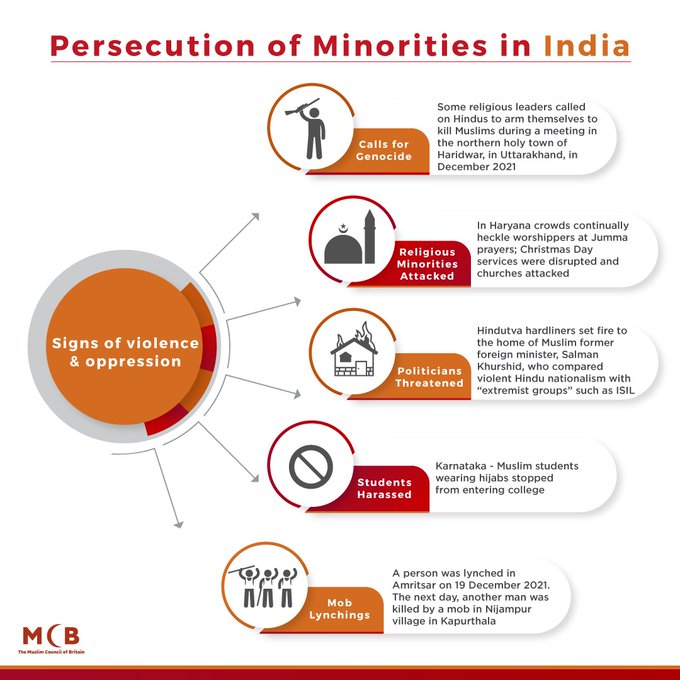

Mob Lynchings
A person was lynched in Uttar Pradesh after false reports he had been transporting cows for slaughter when in fact they were for dairy purposes by a cow vigilante group. India’s Prime Minister Narendra Modi in 2016 criticised the group
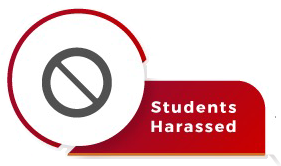
Karnataka – Muslim students wearing hijabs stopped from entering college
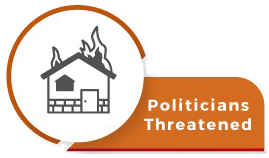
Politicians Threatened
Hindutva hardliners set fire to the home of Muslim former foreign minister, Salman Khurshid, who compared violent Hindu nationalism with “extremist groups” such as ISIL
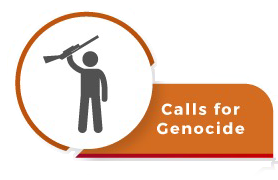
Some religious leaders called on Hindus to arm themselves to kill Muslims during a meeting in the northern holy town of Haridwar, in Uttarakand, in December 2021
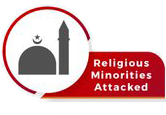
Religious Minorities Attacked
In Haryana crowds continually heckle worshippers at Jumma prayers; Christmas Day services were disrupted and churches attacked
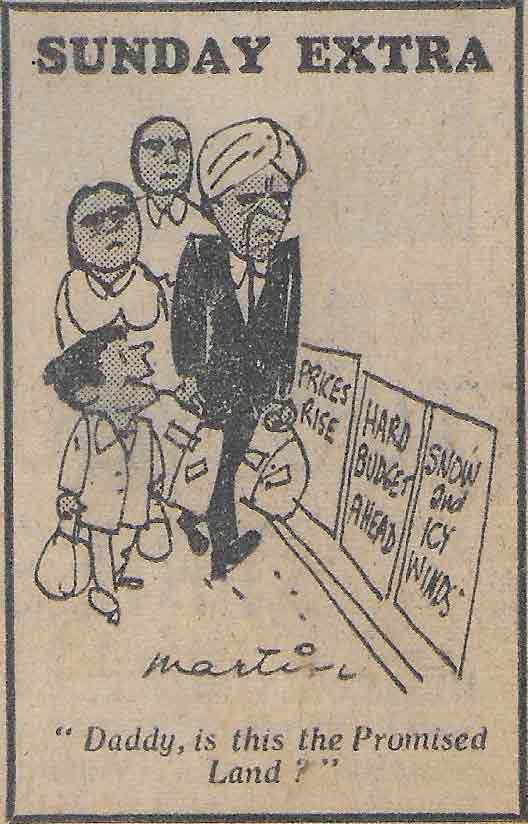
Two Indian Gujerati’s arrived in the UK, with as much possessions as they could carry; having left their home after the deadline of Idi Amin’s tyranny.
Sitting at arrivals, one party feeling tired and dejected from the journey to the UK wonders what they can do.
The other comes back after a short walk outside. He sits down and complains. “It’s Sunday, I am hungry, there is no food to eat and there are no open shops outside. What are we going to do?”
His friend looks back at him, smiles and says. “We are going to be rich!”
Gujerati’s have since then formed a valuable portion of the business community in the UK, from the aforementioned corner shops to so many more businesses.
How about you? Did you arrive on that trip from Uganda? Or were you related to that generation in any way?
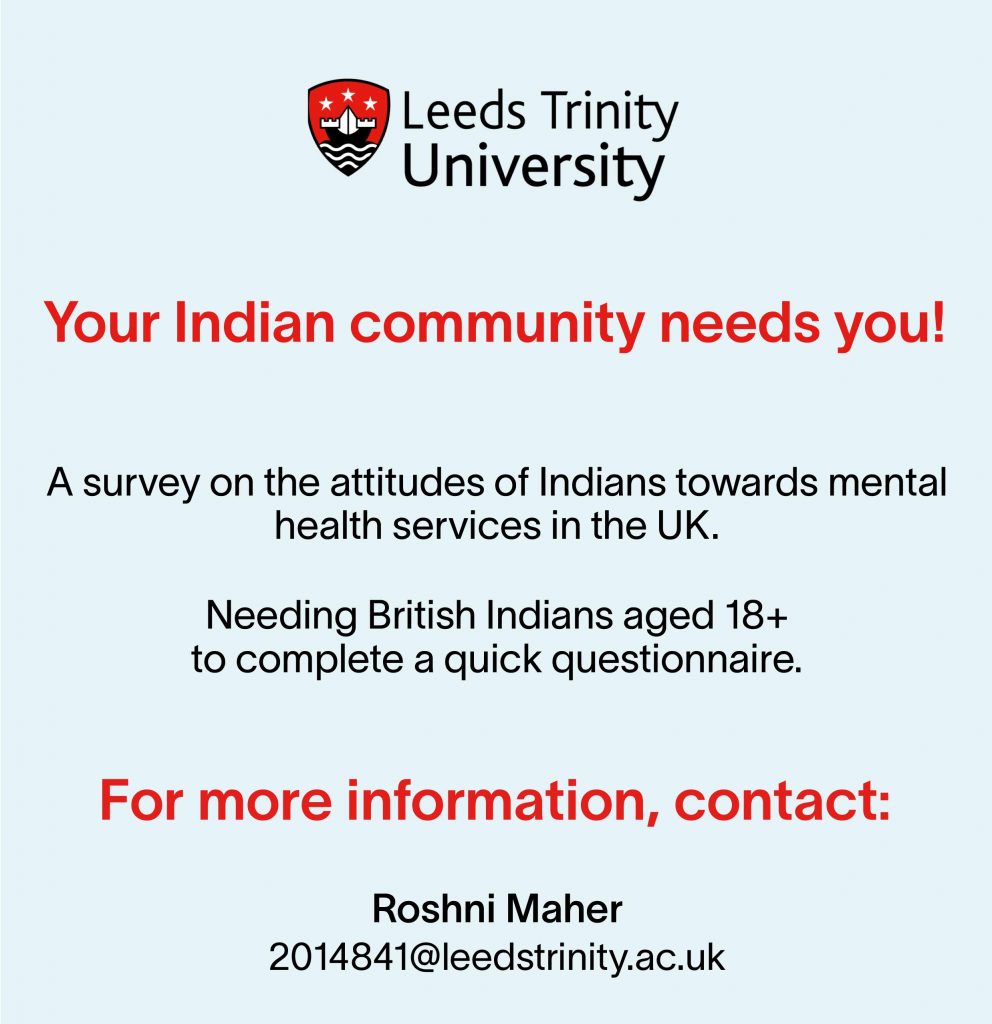
My name is Roshni and I am currently studying Masters in Psychology at Leeds Trinity University, looking at the attitudes of Indians towards mental health services.
As part of my thesis, I am asking Indian Britons (irrespective of gender or religion) to fill out a quick questionnaire on their attitudes toward mental health services. I have translated the survey into Hindi too. I have worked very, very hard with the help of doctors, psychiatrists, and professionals to translate the various surveys. Please could I ask you to complete the survey and then request that you pass it on to at least three friends who are of Indian descent? I need at least 350 people to gain meaningful data. The survey is open and will close on 10th September.
It would be very much appreciated if you could promote this study through your website and social media accounts (such as Facebook and Twitter) as well as in the building itself.
The survey is available in English and Hindi.
English survey:
https://ltu.onlinesurveys.ac.uk/attitudes-towards-mental-health-questionnaire-english2
Hindi survey:
https://ltu.onlinesurveys.ac.uk/d63ee7a5ns
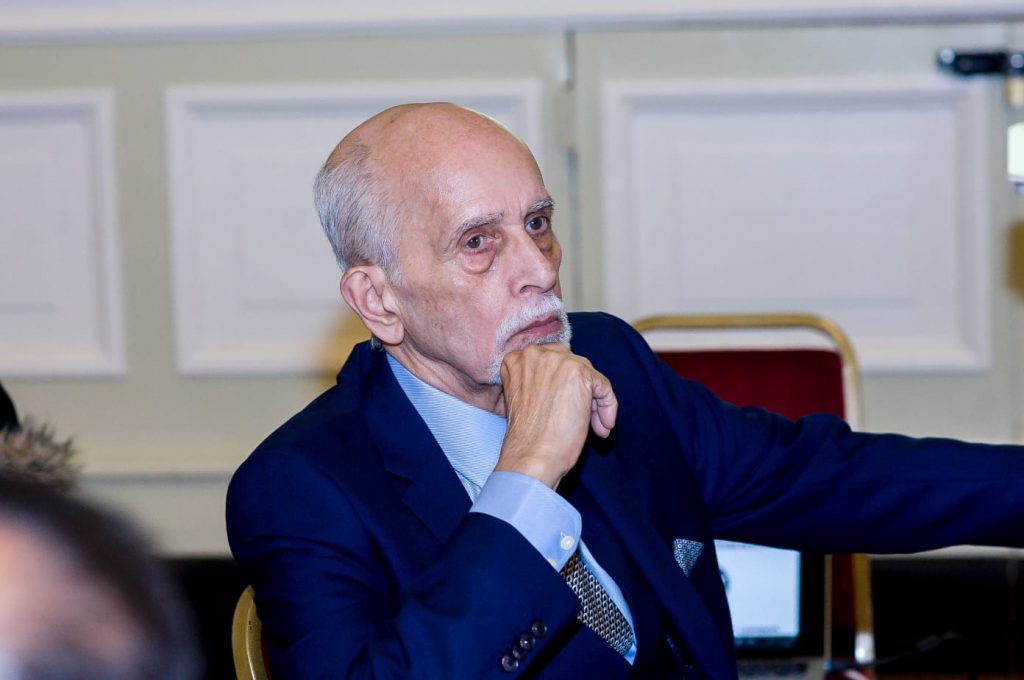
Shamsuddin Ismail Agha, President of the Indian Muslim Federation (UK) was born in Bombay (now Mumbai) India. He received his B.A. (Hon) and M.A. from Bombay University and theatre training in Bombay and London. He was a lecturer of classical Persian and English in India. He came to England in 1964 and after working in different jobs and living for a short period in Bolton he worked as a teacher in London. He was a linguist and worked as a curator at Leyton Library and later retired from London Borough of Newham as Head of the Translation Unit 25 years ago.
He was a founder member and trustee of the Indian Muslim Federation (UK) established in 1969, the largest and oldest organisation of Indian Muslims in the UK which has NGO status with the United Nations. The Indian Muslim Federation has its offices and a community center in east London. Under Agha’s leadership, IMF has organised many seminars and meetings on the plight of Indian Muslims and has held the protest marches against anti-Muslim pogroms in India.
After being accredited as with Non-Governmental Organisation status by the United Nations in 1999, the IMF delegation under Agha’s leadership attended many UN conferences and meetings in Geneva, New York and South Africa to raise the plight of Indian Muslims at the international level and published papers and booklets on the plight and suffering of Muslims in India.
Agha was a linguist, writer, academic and above all a community person. He has written and acted in many plays in India and Britain. He was responsible for the production and direction of a series of one-act plays in Urdu, Gujarati, Marathi and English. His books of plays in Urdu “Wahshat Hi Sahi” (Madness Rules Okay) and plays “Mirza Ghalib in London”; “Tipu Sultan” and “Flight Delayed” were published in India and the UK and were well received in the academic circle.
His burial was held on Thursday, 22 June 2021 at Muslim Burial Trust Cemetery, Waltham Forest, London, and was attended by many leaders across the community. Condolence messages were received from many organisations with whom Agha worked closely including cabinet members and councillors of Waltham Forest Council and Newham Council, General Secretary of Muslim Council of Britain and Minister Co-ordination of Indian High Commission, London. Agha is survived by his daughter, son and one granddaughter.
It is with a very heavy heart that we have to inform you of the death of our long time President Shamsuddin Agha.
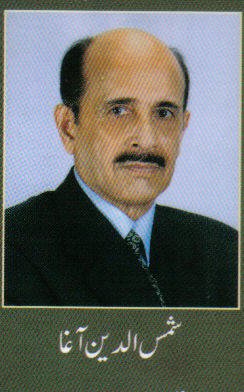
رَاجِعونَ إِنَّا لِلّهِ وَإِنَّـا إِلَيْهِ
For Allah are we and to him do we return
The burial was at Waltham Forest Muslim Burial Trust Cemetery (Folly Lane).